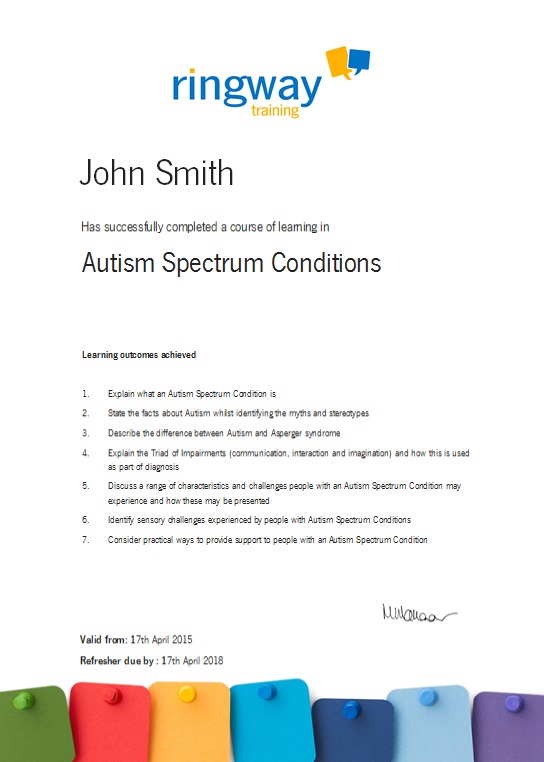Key Info
1 Day Course
Contact us if you require training which runs to a different timescale
Where and When
Delivered at a venue of your choice throughout the UK or by tutor led remote online delivery, contact us for availability.
Accredited Course
The course content are accredited by the Open College Network (OCN) Credit4Learning as a Level 3 course.
Course Overview
Supporting children in care is a rewarding and challenging role and looking after other people’s children has additional responsibilities, restrictions and risks. This is why Safe Care, Safe Care Plans and allegation procedures are an important way of safeguarding everybody and providing the best care possible.
This training course confirms the meaning and key principles of Safe Care, the contents which should be included as part of a safe care plan and questions which should be asked as part of essential planning and preparation for potential placements.
This training course confirms the meaning of an allegation, the reasons why allocations can occur and the procedure which needs to be followed when dealing with allegations and raising concerns.
This training course confirms the reasons why suspension is sometimes required as a positive way of protecting children and carers who may have had allegations made against then, the impact which this can have and the support mechanisms which need to be in place for carers who may be involved in the allegation and suspension process. This is a Level 3 Accredited Course.
Course Learning Outcomes
Below are the main topics covered in this course, expand each one to see the criteria.
- 1.1Describe the meaning of Safe Care and a Safe Care Plan
- 1.2Define the key principles of Safe Care
- 1.3Explain the importance of committing time to planning and preparing for placements
- 1.4State who should be involved in placement planning and preparation stages
- 1.5Identify questions to ask when considering a placement
- 1.6Describe potential reasons why individual placements may not be suitable at the ‘material time’
- 2.1Explain the requirement of a Safe Care Plan
- 2.2Confirm essential information which should form the contents of a Safe Care Plan
- 2.3Describe individual support and training needs in relation to specific placements
- 2.4Confirm the meaning of ‘Delegated Authority’
- 3.1Explain considerations to be made for individual placements in relation to safe ways of working including; Showing Affection, Secrets, Bathrooms, Bedrooms, Play, Photographs, Alcohol, Smoking, Medication, Devices, Mobile Phones, Social Media, Visitors
- 4.1Define the meaning of the term ‘allegation’
- 4.2Describe what may constitute an allegation
- 4.3Explain reasons why allegations can be made
- 4.4Describe the impact of allegations on children and carers
- 4.5Describe the impact of suspension
- 5.1Explain why some children may find it difficult to disclose present or historical harm, abuse or neglect
- 5.2Explain the importance of an open and child accessible disclosure procedure
- 6.1Explain the procedure to be following in raising concerns about a child’s welfare
- 6.2Explain the procedure to be following for allegations made against a carer
- 6.3Confirm the reasons why a carer may be suspended as a way of protecting the child and the carer
- 6.4Describe support mechanisms which need to be in place in the event of a suspension
Accreditation
The course content are accredited by the Open College Network (OCN) Credit4Learning as a Level 3 course.
Additional Information
Training course duration
1 Day (please contact us if you require training which runs to a different timescale).Availability of this training course
This Dealing with Allegations training course is available as in-house training at a venue of your own choice throughout the UK. Alternatively, also available remotely via a tutor led course over Zoom or MS Teams.Audience for this course
This Dealing with Allegations training course is designed for professionals working with children and young people including support teams, education professionals and foster carers.QCF Units
<p>This Dealing with Allegations course is designed to meet the standards outlined in the new Children’s Homes (England) Regulations which were introduced on 1st April 2015 and can contribute to outcomes of QCF units including the National Diploma for the Children and Young People’s Workforce.</p>Get a Price or more information...
Just fill in this quick form and we will email you an all inclusive price, don't worry we will never add you to any marketing lists - promise. If you want more information first thats great - just get in touch
Clear pricing
We ask for location and approximate numbers because we include any expenses in the quotes we give so you get one clear price
More Information?
If you have any questions, want more information or interested in a series of courses please contact us
Contact Us
